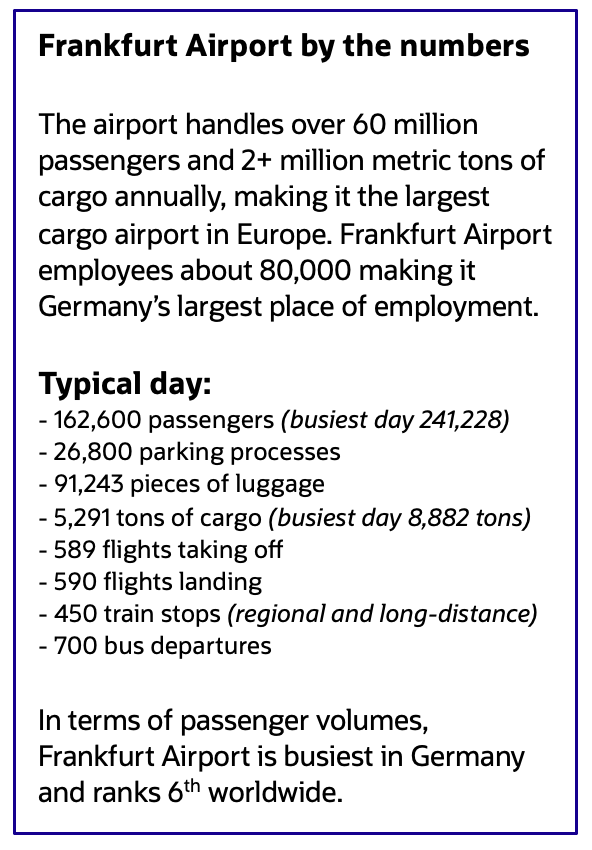 Fraport AG is one of the leading companies in the global airport business, operating at 29 airports on 4 continents. Among others, they operate Frankfurt Airport, Germany’s largest aviation hub, providing the full range of operational and management services relating to airside and terminal operations with extensive logistics and maintenance facilities. Fraport relies on Oracle technologies to keep its critical IT systems and application-data running 24 hours per day, 365 days a year.
Fraport AG is one of the leading companies in the global airport business, operating at 29 airports on 4 continents. Among others, they operate Frankfurt Airport, Germany’s largest aviation hub, providing the full range of operational and management services relating to airside and terminal operations with extensive logistics and maintenance facilities. Fraport relies on Oracle technologies to keep its critical IT systems and application-data running 24 hours per day, 365 days a year.
We discussed with Thomas Langner, Senior Manager – Server and Cloud Management and Frank Herzer, Delivery Manager for Oracle Database and Server Systems at Fraport how they’re using Oracle Exadata Database Machine and ZFS Storage Appliance to meet strict availability, performance, and reliability service level agreements (SLAs).
 A long-time Oracle Database customer, Fraport embarked on a strategic initiative in 2014 to consolidate all their Oracle databases on one platform with goal of using the same architecture stack for production as well as development and test environments. Purpose-built for Oracle Database, they chose Oracle Exadata Database Machine as their consolidation platform to give them the predictable performance and availability required to keep their applications and airports running at peak efficiency.
A long-time Oracle Database customer, Fraport embarked on a strategic initiative in 2014 to consolidate all their Oracle databases on one platform with goal of using the same architecture stack for production as well as development and test environments. Purpose-built for Oracle Database, they chose Oracle Exadata Database Machine as their consolidation platform to give them the predictable performance and availability required to keep their applications and airports running at peak efficiency.
Thomas Langner related that, “we reached a strategic milestone consolidating our Oracle Database environments on Exadata— we love Exadata because it’s really fast, resilient, and stable with great support!”
Fraport initially deployed four Exadata Database Machine systems—two for production and two for dev/test deployed in stretch cluster configurations spanning across both Fraport’s data centers. Oracle Active Data Guard automatically replicates databases between the data centers and backups were initially performed locally at each site from Exadata to NetApp storage.
As is the case for most organizations, Fraport experienced high year over year data growth which made it difficult to meet performance SLAs. While Exadata performance rose to the challenge, their backup environment couldn’t keep up with demand. Critical applications that have a Recovery Time Objective (RTO) of 1 hour were taking 9 hours to restore—beyond unacceptable to Fraport management.
Investigating the root cause of their performance issues, Fraport realized that their existing NAS device couldn’t deliver the throughput needed to meet their 1 hour restore requirement. They were in the process of refreshing the Exadata systems and began searching for a new storage appliance for backups that could meet their performance requirements and gracefully accommodate growth. After reviewing leading storage vendors, they found that the Oracle ZFS Storage Appliance delivered the performance they needed with room to spare for continued data growth.
Frank Herzer said, “ZFS Storage Appliance was the only NAS solution we could find that could meet our 1-hour Recovery Time Objective (RTO). We found that direct connecting the ZFS Storage Appliance to Exadata was a huge performance advantage and it freed up network bandwidth.” He then added, “With ZFS Storage Appliance, our database restores are over 5.7x faster taking only 17 minutes to restore a 1 TB database versus 1.6 hours with our previous NAS device.”

While the cost of downtime varies by application and industry, Thomas explained that every airport has a few mission-critical applications in which downtime of ½ hours could limit the number of flights to as few as 2 per hour and a 2-hour downtime shuts down airport operations. He then enthusiastically stated, “Exadata and ZFS Storage Appliance were game changers enabling us to meet SLAs and easily accommodate peak demands; it’s good for our customers and our business—I’m really happy with this stuff.” It’s worth noting that Fraport customers are ultimately anyone traveling through Frankfurt International Airport.
Frank added “Exadata and ZFS reduce management complexity and greatly simplifies patch management; we have single pane of glass management, one technical support resource and no integration hassle of 3rd party components to manage or test.”
Logistics and operational management of a large international airport is not for the faint of heart. Fortunately, if you are traveling through Frankfurt Airport, Fraport has an experienced workforce that understands passenger and airline needs and is committed to continuously improve customer experience at airports. They also empower their IT staff to choose best-of-breed technologies to get the job done right because an airport never sleeps.

